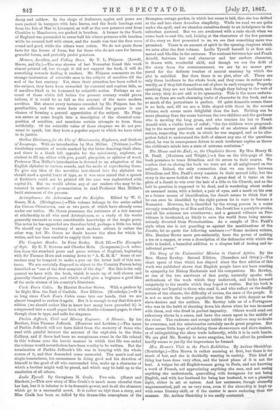Leslie Tyrrell By Georgiana M. Craik. Two vols. (Hurst and
Blackett.)—This new story of Miss Craik's is much more cheerful than her last, but it is inferior to it in dramatic power, and in all the elements which go to a successful novel. It is rather an idyl than a story, and Miss Craik has been so lulled by the dream-like atmosphere of the
Brompton cottage garden, in which her scene is laid, that she has drifted at the end into sheer Arcadian simplicity. While we read we are quite under the spell, and we abandon ourselves freely to an indulgence in the suburban pastoral. Bat we are awakened with a rude shock when we come back to real life, and, looking at the characters of the few persons of the story as first presented to us, we see that something more was promised. There is an amount of spirit in the opening chapters which we miss after the first volume. Leslie Tyrrell herself is at first ani- mated and life-like in the extreme. The contrast between her and Frank Arnold, between her real character and her surface character, is drawn with wonderful skill, and though we see the drift of the story from the commencement, we are by no means pre- pared for the delicate touches of mental anatomy by which the plot is unfolded. But then there is no plot, after all. There are only three incidents in the whole book, and they come in rather awk- wardly, as if they felt themselves out of place in such company. Properly speaking, they are not incidents, and though they belong to the web of the story, they do not add to its symmetry. This is the more unfortu- nate, as there are such charming traits of character in the book, and as so much of the portraiture is perfect. Of quiet domestic scenes there is no lack, and, till we are a little cloyed with those in the second volume, each seems more delightful than the last. Nothing can be more pleasing than the scene between the two children and the gardener who is mowing the long grass, and who touches his hat to Frank Arnold with a visible look of relief ; "for the children were propound- ing to the mower questions and remarks of an abstruse and difficult nature, respecting the work in which he was engaged, and as he alto- gether failed to understand the drift of almost any one of the questions asked, he was in consequence driven to such irrelevant replies as threw the children's minds into a state of extreme confusion."






























 Previous page
Previous page